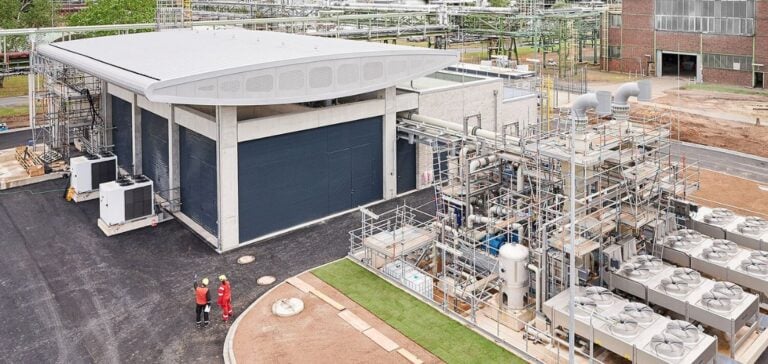Shell Deutschland GmbH has announced the final investment decision for REFHYNE II, a 100 megawatt proton exchange membrane (PEM) electrolyzer located at Shell Energy and Chemicals Park Rheinland, Germany.
Using renewable electricity, REFHYNE II will produce up to 44,000 kilograms of renewable hydrogen per day, helping to reduce carbon emissions at the site.
The electrolyzer is scheduled to begin operations in 2027.
Regulatory context and political support
The REFHYNE II project is supported by favorable policies, including the European Union’ s binding targets for the use of renewable hydrogen and the German federal government’s regulatory framework.
The project has also received funding from the European Union’s Horizon 2020 program for research and innovation.
According to Huibert Vigeveno, Director of Downstream, Renewables and Energy Solutions at Shell, “the investment in REFHYNE II demonstrates our commitment to the hydrogen economy, essential to decarbonizing our operations and our customers’ products.”
Planned uses for renewable hydrogen
The renewable hydrogen produced by REFHYNE II will be used at Shell Energy and Chemicals Park to manufacture energy products such as low-carbon transport fuels.
In the longer term, this hydrogen could be directly supplied to reduce regional industrial emissions in response to changing customer demand.
REFHYNE II will benefit from the experience gained by Shell and its partners ITM and Linde in developing similar projects in Europe. This project follows on from the success of REFHYNE I, a 10 MW PEM electrolyser in operation since 2021.
Since then, detailed engineering plans and preparatory work on the REFHYNE II site have been underway.
Investment outlook
Shell plans to invest between $10 and $15 billion from 2023 to 2025 in the development of low-carbon energy solutions, including e-mobility, low-carbon fuels, renewable energy production, hydrogen and carbon capture and storage.
By 2023, Shell had invested $5.6 billion in these solutions, representing 23% of its capital expenditure.
The REFHYNE II project is therefore in line with Shell’s strategy of reorienting its energy and chemical fleets towards the supply of low-carbon molecules to its customers.
At the same time, Shell is building Holland Hydrogen I in the Netherlands, with a capacity of 200 MW, one of the largest renewable hydrogen projects in Europe.
For Shell, the hydrogen produced by REFHYNE II will meet the requirements of renewable fuels of non-biological origin (RFNBO) in line with current EU legislation.
The investment in REFHYNE II exceeds the internal rate of return (IRR) required for Shell’s Renewable Energy and Energy Solutions business, as reported at Capital Markets Day 2023.
This investment is a key element of Shell’s strategy to reallocate its energy and chemical parks to provide low-carbon molecules to its customers.
In addition, projects such as REFHYNE II show how favourable policies and adequate financing can catalyze the transition to cleaner energy sources.






















